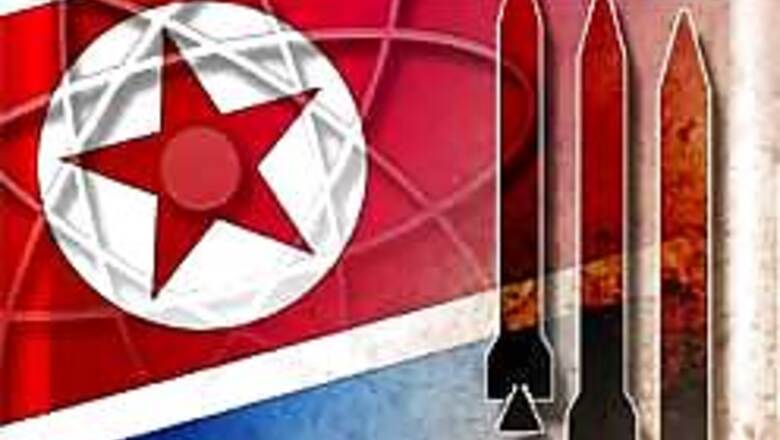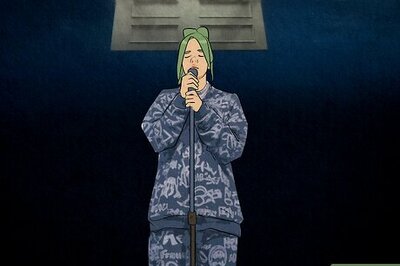
views
Washington: The United States believes North Korea attempted to detonate a nuclear device but that "something went wrong," and the blast was relatively small, a US government official said Tuesday.
The official confirmed North Korea informed the Chinese government before the test that it would involve a four-kiloton nuclear device, a small explosion compared with the 15-kiloton nuclear tests that India and Pakistan conducted in 1998.
Also, an unnamed North Korean diplomat admitted the test was smaller than expected, the South Korean newspaper Hankyoreh reported on Tuesday.
The United States cannot say for sure the underground detonation was a nuclear blast; the working assumption is that it was, but not very successful, said the official who spoke to CNN.
Another US official said it is possible North Korea may attempt a second test but cautioned there's no evidence of any preparations at another site.
"I would not say we expect it, but it would not be a total surprise," the official said on condition of anonymity because he is not authorized to speak publicly.
Russia's defense minister said Tuesday that his agency has estimated the power of the explosion at between five and 15 kilotons.
The US intelligence community is sticking by an estimate that the blast was about a half-kiloton, or even less, although it's possible the tunnel in which the test took place could have "muffled" the seismic waves, an official said.
Angry reaction around the world
Meanwhile, nations were lining up against the reclusive regime of Kim Jong Il, with even longtime ally China saying Monday's reported nuclear test should bring "punitive actions."
South Korea's Yonhap news agency, in a dispatch carried by The Associated Press, quoted an unidentified North Korean official as saying, "We hope the situation will be resolved before an unfortunate incident of us firing a nuclear missile comes."
John Bolton, the US ambassador to the United Nations, dismissed the report as a North Korean attempt to bully the United States into bilateral talks.
"This is the way North Korea typically negotiates, by threat and intimidation," Bolton said. "It's worked for them before. It's not going to work this time."
US Secretary of State Condoleezza Rice, speaking on CNN's "The Situation Room," also called North Korea's threat a bad idea, saying that Pyongyang is aware of the consequences.
"North Korea knows that firing a nuclear missile, shall we say, would not be good for North Korean security," she said. "The North Koreans are not confused about what it would mean to launch a nuclear attack against the United States, one of our allies or someone in the neighborhood. They're not confused about that."
Despite the reported threat, North Korea's missiles are not likely to be capable of carrying a nuclear warhead, and a test firing of an alleged long-range missile failed in July.
PAGE_BREAK
Bolton said the United States has talked one-on-one with its North Korean counterparts on the sidelines of the stalled six-party talks and will continue to do so if Pyongyang returns to the negotiating table.
"If they want to talk to us, all they have to do is buy a plane ticket to Beijing," Bolton said.
But North Korea has shunned the talks in favor of bilateral negotiations with the United States.
The Bush administration has refused to negotiate with Pyongyang without the input of South Korea, China, Russia and Japan.
Bolton said the North Korean regime is unwilling to take part in the multilateral negotiations "because they're not getting what they want."
UN considers sanctions
North Korea now faces the threat of UN sanctions which, diplomats said, are tailored after existing sanctions imposed by the United States.
A draft resolution attempts to target the country's weapons and illicit drug trade to punish Kim's regime and not civilians, Bolton said.
North Korea's people often go hungry, with the government unable to provide for basic needs after decades of economic mismanagement.
"Our aim in the sanctions we proposed is precisely not to do anything to worsen the terrible condition of the people who have suffered under this regime," Bolton said.
"Our draft resolution, in fact, carves out explicit exemptions for humanitarian supplies. To the extent that we are able to, we will try to keep that flowing to the North Korean people who need it."
Japan has tacked on additional sanctions to the draft resolution.
How stiff possible sanctions would be in the end is unclear.
Although they joined other nations in condemning Monday's test, the ambassadors of veto-wielding Security Council members Russia and China - who have opposed sanctions against Iran for its nuclear program - have been vague on whether they would also oppose such a move against North Korea.
But on Tuesday, Wang Guangya, China's ambassador to the United Nations, signaled that his country may be willing to support limited sanctions. "There has to be some punitive actions, but also I think these actions have to be appropriate, so we will discuss with others," he said.
Asked what measures China would support, he said, "It is punitive. I think that implies something."
Russian Defense Minister Sergei Ivanov indicated there was some difference between his country's approach to Iran and its dealings with North Korea.
"What's the difference between the situation in North Korea and Iran? In my opinion - according to all information available - Iran doesn't have a nuclear device, not even any enriched uranium or plutonium, while North Korea does," Ivanov said. "That's the primary difference between the two countries, and I hope you agree with me that it's substantial, very substantial."
Pak Kil Yon, North Korean ambassador to the United Nations, scoffed at the idea of sanctions Tuesday. "Sanctions will not solve the problem at all," he said.



















Comments
0 comment